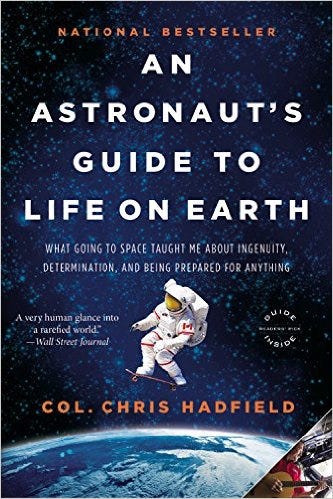Learn about preparation from one of the people who are the best at preparation, an astronaut

The author explains in an entertaining way and great detail the arduous but fascinating path to becoming an astronaut. If you want to become an astronaut the odds are stacked against you from the beginning. You have to complete years of training and compete with very skilled candidates. A Ph.D. is just a little bonus. You have to be in perfect physical health as well as learn a great variety of skills. In the space shuttle era, the expertise of each astronaut could be a little more specialized. But in the Soyuz, there is only room for 3 people. So each one has to have training in a great variety of disciplines, piloting the spaceship, performing experiments in space, walking in space and a great capacity for teamwork are only the basics.
The importance of being prepared
If I’d pick a single thing from this book, it would be the importance of being well prepared. The ratio of preparation and actually performing the stuff you prepared for is basically 99% to 1% respectively.
Once you have been a fighter pilot and then a test pilot for years, oh I forgot, once you are one of the very BEST fighters and test pilots. You may get accepted for a career as an astronaut. Screwing up is the first thing which has to disappear from your vocabulary.
Or more specifically, you can only screw up in simulations, but even there, astronauts try to avoid making errors at all costs. No one wants to “die in the simulator.”
A big part of an astronauts training is simulating experiences they might never actually encounter. Simulations may produce engine trouble, computer meltdowns, explosions, and fire, to name just a few.
The author tells an experience where he once failed to prepare well for a situation when he still was a test pilot. He went back into the fighter that day with all of his material and performed the whole flight mentally until it became second nature. That is essentially what astronauts do. They train til they are ready to encounter and solve any situation calmly.
Chris Hadfield, the author, calls this “the power of negative thinking.” Once you have prepared for everything that could go wrong, you feel a calmness knowing that you will make the right decisions no matter what happens.
Criticism and learning from other’s mistakes
A crucial skill of an astronaut is to be able to take criticize in a constructive manner. Constructive critique means pointing out mistakes and acknowledge mistakes in an objective manner, without taking it personally.
Learning from other people’s errors can make the difference between life and death. Often even pilots and astronauts make mistakes, when that happens, they share those experiences with their team even if that means exposing their errors to an inherently competitive environment where errors aren’t desired. Those errors often lead to changes in the Flight Rules and save the rest of the crew from making the same mistakes.
Dealing with physical isolation
Hadfield tells how the intense and endless training made him essentially a stranger in his own home. Despite the great support and comprehension his wife gave him for his job, he tried to make up for the important dates he wasn’t present by arranging cards and gifts in advance, so they arrived for his wife on the right day.
Preparation even in family life, is an important factor for people who have demanding jobs like astronauts.
Life on the ISS is demanding but produces great science.
Astronauts on the ISS spend their time by exercising, researching and performing the rest of daily tasks assigned by NASA. Exercise is an essential part of the routine as bones and muscles waste away when they are not used. Moving through the ISS requires so little energy in weightlessness that astronauts have to use specialized equipment for their training. Research spans a wide variety of topics including medicine and robotics. The role Hadfield played through his educational videos in space had a big influence in public’s interest in space exploration.
Back to earth
Once back to the ground, astronauts often have a new appreciation for life on earth. Space is not only fascinating but also lethal to life. Having this realization made Hadfield develop a new perspective on life on earth. Finally, what he learned as an astronaut helped him a lot for a normal earth-life too.
If you liked this summary, please click ? so that more people can find it.
